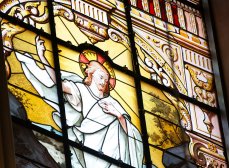|
Family lore held that Cornelius’ own eventual vast fortune began with a treasure trove found beneath the house. The treasure was either concealed under a hole of the rock floor of the cellar, or more fancifully recounted, Durant dreamed of treasure in the lake behind the house and following the cues in his dreams he dragged from the waters a chest containing coins and other valuables. Regardless of how he found this treasure, tradition asserts that these valuables were the nucleus of the large fortune he gained in the West Indies.
In 1766 Cornelius traveled to St. Croix where an older brother, Thomas, already resided since 1761.
“I went to the island of St. Croix, in the West Indies; in the year 1766, and resided there till the year 1778, and have resided there at different times considerably since,"
he noted late in his life.
The two brothers went into business together, probably building upon family connection to powerful merchants like the Waldos, operating plantations, and serving as agents in the Dutch territory for their North American brethren. Records show they sold hundreds of enslaved Africans over the years just for Samuel and William Vernon, two of the most prominent Newport, RI, slave traders. They worked for others as well. The brothers also underwrote insurance policies with men like Israel Thorndike and John Coffin Jones, also prominent in the slave trade.
Cornelius traveled back and forth to Boston quite a bit. He and his brother participated in the Revolutionary War. He was friends with John Adams and Alexander Hamilton. He was a respected merchant.
Over time through inheritance and his own business acumen, Cornelius would acquire significant land and investments in Boston, Maine and the island of St. Croix, making him one of the wealthiest men in New England. Given that slavery was abolished in Massachusetts in 1783, his northern estates may not have continued enslaved servitude, but not so for his properties in St. Croix. Slavery would not be abolished in St. Croix until 1848. In 1789, Cornelius placed an advertisement in the Boston Gazette:
“A negro servant lad named William, about 19 years of age, belonging to Cornelius Durant of St. Croix. – He carried off with him a superfluity of Wearing Apparel. – All and every person or persons are herby forbid and cautioned against harbouring said Servant …”
Cornelius married twice, first to Mary Tothill Hunt in 1766. After her death he married Mary Fenno in 1782. They had one daughter, Maria Cornelia Durant, born in 1789. She was a beautiful woman, and she caught the attention of lawyer and orator Andrew Ritchie. They married in 1807. They did not have children. Cornelius died five years later in 1812. In consequence of this marriage, after the death of his father-in-law, Andrew became, by right of his wife, owner of a plantation in St. Croix and executor of Cornelius’ entire estate. By Danish law, he, to retain possession of the plantation, was required to reside there; and for many years this was his place of residence, although he often visited Boston and spent a great part of his time in the United States.
|

